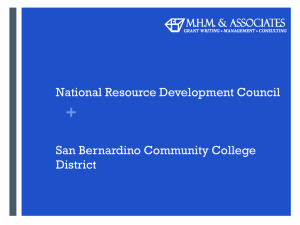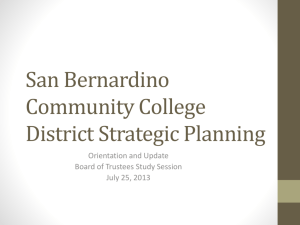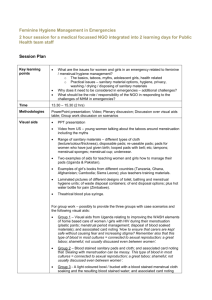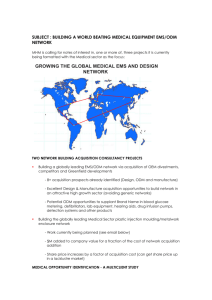e3p3 Model for Cities
advertisement
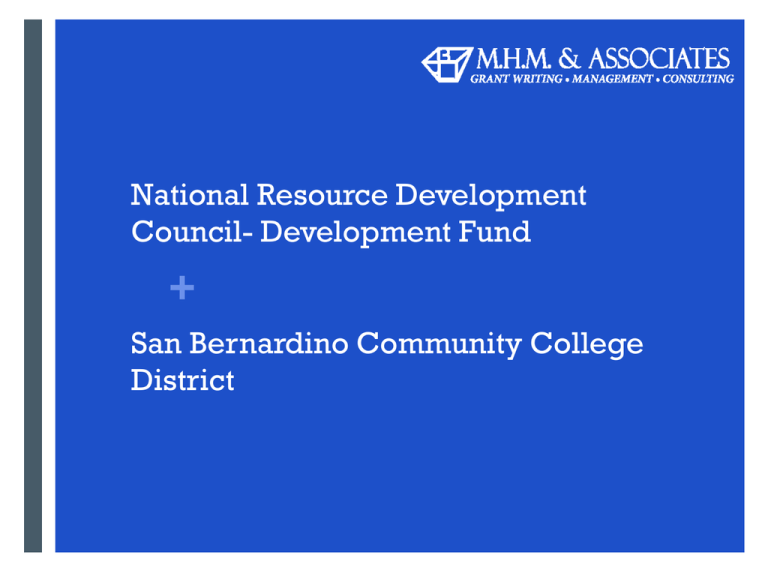
National Resource Development Council- Development Fund + San Bernardino Community College District Strategic Partnerships The National Resource Development Council (NRDC) Serving in validating the e3p3 model in: improving and sustaining education beyond current efforts + The Primary Funding Streams for Most Local, State and Federal Grants: e3 p3 Model Economics Environment - Supports Education and Builds Skills Supportive of Local Economic Opportunities - Makes Generational Education Possible PUBLIC PRIVATE PARTENRS EQUITY - IN EDUCATION (and Social Services) - Localized Economic Engines Resulting fromand Environment Conducive to Growth (Local Talent and Education) Self-sufficient in Sustaining Targeted Outcomes Capacity Building and Resource Development Services A. Expand SBCCD’s educational impact among area residents and their transition from area high schools/adult schools using proven models and practices B. Accelerate efforts that advance SBCCD’s priority programs and strategies using funded Mission Related Investment (MRI) and Program Related Investment (PRI) models that increases hiring opportunities, the quality of education, the quality of services in the classroom, and access to support – elevating attendance/enrollment C. Maximize the use of public, private, partnerships (p3’s) for increasing resources and matching funds Professional Services Include – 1 Developing Fundable Grant Applications and Investment Platforms - using proven systems and models that engages partners and investors to be instrumental in increasing diverse income streams/grants into SBCCD (that will also enhance the efforts of SBCCD’s colleges, foundation, and radio station in accessing grant funds) Capacity Building and Resource Development Services Professional Services Include (Cont.) 2 Providing Capacity Building, Grant Trends and Analysis Training and Workshops that prepares SBCCD’s colleges, foundation, and radio station in building fundable models (leveraged with p3’s/investor funding). 3 Developing Mission Related Investment (MRI) and Program Related Investment (PRI) project models that appeal to Social Investors and supports the districts ability to sustain Unrestricted Operating Support (core support). 4 Making SBCCD one of the Primary Beneficiary of Grants Allocated through USC’s Partnership with 11 Federal Funding Agencies (committing $1.3 Billion in funding)through its 2014 Grant Award and 2015 Grant Amendment to include the Inland Empire. 5 Creating a Pool of Unrestricted Funds supported by p3’s that increases access to Unrestricted Operating Support (core support) and Restricted Operating Support (directed) grants/funding and investments. M.H.M. & Associates Enterprise, Inc. (MHM); National Resource Development Council (NRDC) MHM – Led by Luvina Beckley - CEO/President - Serves Southern CA – Over 20 years - Ranking of successful grant firms in Western Region - Increased grant revenue by over 200% for clients - Over a 87% success rate for Grant Logic Models and Partnerships created - Recognized by State of California’s State Department of Health/Human Services s for Designed Collaborative Structure (2005) - Recognized by over 7 Federal Government agencies as a ‘Strategic Resource Developer’ - Serves as expert reader for State of California’s Department of Education NRDC’s Executive Team - Samuel Soret, PhD - LLU School of Public Health and Center for Community Resiliency; - e1 Environmental Sustainability and e3 Equity in Education and Social Services - Dr. Leonard Mitchell – USC Center for Economic Development e2 Economic Development (and Training) - Kim Kirner, PhD - CSUN Professor of Anthropology – e3 – Equity in Education - James Kyle II, MD - Former Board Member of The California Endowment) Current CMO Regional Health Care Corporation- p3 – Public and Private Partnerships M.H.M. & Associates Enterprise Inc. (MHM) National Resource Development Council (NRDC) Solutions Team MHM and the NRDC will deploy a solutions team that will be comprised of five (5) members, with one Senior Level Executive. The team will includes MHM’s Senior Grants and Partnership Development Managers that have supported efforts and platform used by MHM is securing over $250M in grants Additional Team Members - Assigned trainers, researchers and writers from MHM’s Executive Staff/Grant CREW™, USC’s Economic Development Center, and LLU’s Center for Community Resilience ________ - Commit over 175 hours per month. - Provide e3p3 development services + What is the e3p3 Model and How and Why it Works (Traditional Model) Environment class/campus A. Further SBCCD’s educational impact among area residents and their transition from area high schools/adult schools using proven models and practices Entre/Trade Skills SBCCD e3 Equity Increased Quality of Life/Education Education Framework for Fostering Sustainability and Growth + Existing Model (Individuals) Current System E3 Factors Knowledge E3p3 Created Socio-Ecological System (Educational System) Upstream Downstream Education Inequities Education Disparities Biased Beliefs (isms) Behavior Policies & Practices Neglected Conditions Narrative Change the Narrative Communities Success or Failure Consequences Education Place Policy & Build Power Diversification in place Education Modified From Presentation by Dr. Samuel Soret Associate Dean of Loma Linda School of Public Health Progress Enrollment Engaging Local Businesses, Government as well as Federal, State, Foundations and Public/Private Partnership Present SBCCD’s Resource Development Plan (RDP) [created by MHM] that supports the Board of Trustees’ directives and its 7-year Financial Plan, and new/existing funding and investment streams Establish SBCCD’s Development Fund ( unrestricted funds) to support projects and to serve as a match Engage partners/investors to invest in models Use USC’s Success in getting designation of the area and the attention of 11 federal agencies and the priority that will be given to program designated e3p3 projects (Pilot Cities) – and its increased capacity to leverage funding and investments. Secure Grants, Corporate Giving, Investments that are restricted and non-restricted. Map the Colleges Impact in the Community (that warrants continued funding and support from grantors and investors) B. Accelerate efforts that advance SBCCD’s priority programs and strategies using Mission Related Investment (MRI) and Program Related Investment (PRI) project models that increases the quality of education and supportive services in the classroom, attendance and enrollment + A Shift in Approach We Designed an Approach that - Leverages Capacity For Increased Funding (p3) - Builds Local Economic Opportunities - Create Resilient and Capable Students - Makes Generational Education Possible “Mission Related Investors” Public, Private, Partners (p3) “Program Related Investors” SHIFT IN FOCUS C) Building the capacity of SBCCD in creating a pool of unrestricted funds using p3’s for increasing resources and matching funds supporting hiring, student outreach and enrollment, and special - Disempowers Inequities - Localized Economic Engines - Sustainable Fund = P3’s - Community Training Resiliency SB Community College District Self-sufficient in Sustaining Education and Training Outcomes 3. E3p3 Public Private Partners: Pre-established SBCCD e3p3 Cooperative Development Fund (could very easily reach hundreds of millions) as engaged partners will be asked to sustain their commitments over 5-10 years, minimum to accomplish specified or anticipated educational, social and/or economic returns. Why This Model Works MHM’s Expertise and Proven Successes- As shared in prior slide Solutions Teams – Professional Team of Industry Leaders with heightened expertise in select areas Public/private partnerships - Engaging the likes of JPMorgan Chase and other financial institutions, large CDFI’s, corporations, foundation, federal and state granting agencies and departments, and investors to support SBCCD’s Fund Leadership – MHM, NRDC, e3p3 Project Solutions Team Members; Executive Members/Industry Experts; and Strategic/Current Partners Offerings/Investments – secure social, economic, and/or leverage funding committed to the growth and expansion of equity (access to needed education), and quality environment (classrooms) Fundable Logic Models – appealing to grantors, investors and funders Federal, State, Local Initiatives - the $1.2 Billion in federal funding among 11 federal agencies; CA Prop 98 Funding that will exceed $5.5 Billion for 2015-2016; Foundation Giving exceeding last years approx. $9 Billion; and Other Federal Funding exceeding Recovery Act Stimulus Funding ($840 Billion) Note: Education was at $94 Billion Development Fund – Create and sustain a Development Fund that affords non-restricted funds for college priority capacity and development efforts (vs. bonds and tax increase) Summary of e3p3 Model Activities Include Developing SBCCD MRI’s and PRI’s (based on current priorities) Hosting Workshops on Leveraging Developed MRI’s and PRI’s Hosting Capacity Building Workshops on Trend Analysis, Funded Models Substantiate investment/giving (Match Funds) from P3’s Submit applications for federal and state initiative funding Submit applications for foundation funding Create SBCCD’s ‘Accelerator Fund’ comprised of unrestricted funding Comments, Questions & Answers
